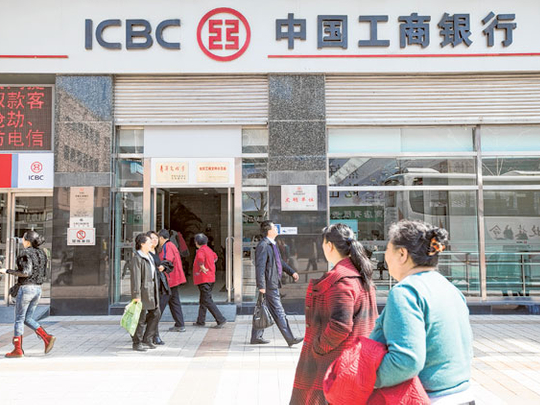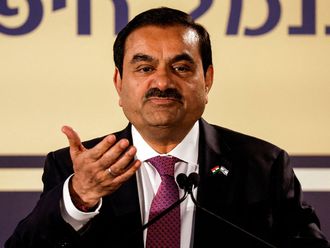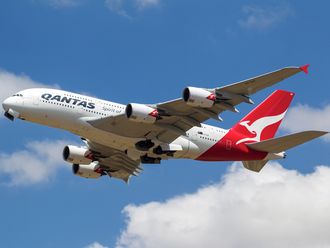
Shanghai/Beijing: China’s biggest banks are resisting government pressure to lower borrowing costs amid an economic slowdown as they seek to maintain the profitability of their lending operations, officials at the top four lenders said.
The banks are limiting discounts for their best corporate clients to ten per cent of the benchmark lending rate, the officials said, asking not to be identified as they’re not authorised to speak publicly. The central bank in July began allowing lenders to offer credit at 30 per cent less than the benchmark rates.
Keeping borrowing costs high may blunt efforts to revive growth that has decelerated for six straight quarters in the world’s second-largest economy. Credit expansion is also limited by the central bank’s loan quotas, the officials said, highlighting the conflicting efforts within China to curb bad debts while boosting funding for local governments’ infrastructure projects.
“Banks can no longer afford to ramp up lending recklessly, as they’ve learned a lesson from the past and their operating environment has deteriorated significantly,” said Rainy Yuan, a Shanghai-based analyst at Masterlink Securities. “The lack of consensus from the top on whether and how to fund local governments’ stimulus projects strengthens our view that China’s economic recovery will be L-shaped.”
Shares gain
Shares of Industrial & Commercial Bank of China, the world’s largest lender by market value, rose to a five-month high of HK$5 (Dh2.3), before trading up 1.2 per cent at HK$4.95 as of 9:56 a.m. Hong Kong time on Friday. Bank of China. gained 1.6 per cent to HK$3.09. The four biggest lenders, all based in Beijing, have underperformed the benchmark Hang Seng Index, which has rallied almost 15 per cent this year.
The central bank is worried about a rebound in bad loans, Vice-Governor Liu Shiyu said in Beijing on Friday. The deteriorating asset quality at banks is linked to the economic slowdown, he said.
The People’s Bank of China and the China Banking Regulatory Commission aim to avoid a repeat of the two-year, 17.6 trillion- yuan (Dh 10.2 trillion) credit boom that propelled economic growth in China following the 2008 financial crisis. That spending binge fuelled inflation and led to three straight quarters of growth in soured loans by the end of June, marking the longest streak of deterioration in eight years.
Government projects The nation’s top planning agency and local governments, meanwhile, are pushing for credit to fund projects. The National Development & Reform Commission had approved more than 700 billion yuan of road and subway construction by the end of August, the 21st Century Business Herald reported yesterday. Local governments, which have committed 275 billion yuan for these projects, need to rely on banks for the rest.
At stake for China are efforts to bolster economic growth amid the global slowdown. Its gross domestic product expanded at the slowest pace in three years during the second quarter as the European debt crisis sapped export demand and efforts to rein in home prices eroded domestic consumption.
Two cuts by the PBOC to key interest rates this year, three reductions in the reserve requirements for banks since November and accelerated approvals for investment projects haven’t been enough to reverse the deceleration. The economy may expand this year at the slowest rate since 1999, according to the median forecast of 45 economists in a Bloomberg survey.
Liberalised rRates
The central bank in June allowed lenders to widen the discount on borrowing costs to 20 percent, and then broadened the limit to 30 per cent the following month, accelerating the liberalization of interest rates. The banks were permitted to offer deposit rates at 10 per cent above the benchmark, marking the first time a premium has been permitted.
China’s benchmark one-year lending rate currently stands at 6 per cent, while the deposit rate is 3 per cent.
Giving the banks more flexibility to compete for funding amid a deposit crunch has triggered investor concern that the banks’ lending margins will probably shrink. The weighted average profit growth at Hong Kong-listed Chinese banks may have slowed to 6.4 per cent in the third quarter from 21 per cent in the first half, analysts at Citigroup Inc. said this week.
Bank of China, the country’s third-largest lender, is scheduled to report third-quarter earnings on Oct. 25, followed by Agricultural Bank of China Ltd., the fourth-largest, the next day. China Construction Bank Corp., ranked No. 2, plans to report on October 29 and ICBC on October 30.
A CCB press official declined to comment. Phone calls to the media offices of the other three lenders weren’t answered.
Though China hasn’t officially announced lending quotas or the total target for 2012, policy makers have indicated the goal is 7.5 trillion yuan to 8 trillion yuan. Banks had made 6.1 trillion yuan of new loans in the first eight months of this year, according to central bank data.
A lack of funding for local government projects may extend the economic slowdown in China, Song Guoqing, an adviser to the nation’s central bank, said last month.











